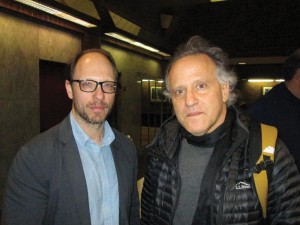
Photo: Hourig Attarian
Michael Rettig
Staff Writer
Misak Medzarents is known as one of the pioneers of Western Armenian poetry. As a romanticist, most of his poetry was more positive than that of his contemporaries. However, Medzarents’ poetry also contained a political aspect that has previously gone unnoticed. On Thursday, March 17, Dr. James Russell discussed the political leanings of Medzarents in his lecture ”Misak Medzarents the Revolutionary: Last and Lost Poems” as a part of the Armenian Studies Program’s Spring Lecture Series, supported by the Leon S. Peters Foundation and the National Association for Armenian Studies and Research (NAASR).
Dr. Russell, Mashtots Professor of Armenian Studies at Harvard University, has spent most of his career studying ancient Armenia. He began his lecture by describing the endangered state of the Western Armenian dialect, which led to him to begin to shift his focus from ancient pre-Christian Armenia to modern Western Armenian literature; specifically to Misak Medzarents, one of the most prominent Western Armenian poets.
“His mastery of the language as well as his complexity and originality are comparable only to Bedros Tourian for this period of Armenian literature. When we read Medzarents, we are not looking at his work just as literature, but as part of the inheritance of an endangered civilization, one that can easily become lost, if we don’t keep it alive.” It was in the process of translating his poetry that Dr. Russell first became aware of Medzarents’ political leanings.
Medzarents lived in a tumultuous period which influenced his political thought. He was raised in Pingian, an isolated village largely independent from Turkish intervention. “The Armenians here lived in security and without any sense of inferiority or danger, which is unusual in the middle of Anatolia,” stated Dr. Russell. However, the village was attacked during the Hamidian massacres of 1895-1896, forcing Misak and his mother to move to Sivas. Medzarents was once again confronted with violence when the son of a Turkish butcher stabbed him in the back simply for being an Armenian. Although he survived, the wound remained to weaken him both physically and emotionally for the rest of his short life. Despite this hardship, most of Medzarents’ poetry was “relentlessly cheerful.”
Dr. Russell described Medzarents as a “technician” of the Armenian language. He was known for incorporating all of the senses into his poetry as well as skillfully playing on words. For example, the Armenian word for “rain” (antsrev), is very similar to the Armenian word for “sun” (arev), which is simply three central letters in “rain” removed. This enabled Medzarents to play on words when he wrote this line from his poem “Song of Life” (Gyanki Yerkuh): “The rain comes down; yet tears of rain predict their own conclusion. Our word for rain contains the suns name as its ending, and crying fades away to smiles.”
In 1902 Medzarents moved to Istanbul where there was a vibrant Armenian intellectual community that boasted several Armenian newspapers and bookstores. Armenians also smuggled foreign newspapers from abroad because of the heavy censorship in the Ottoman Empire. These foreign newspapers enabled Medzarents to be kept abreast of what was happening in the world. He became concerned for the rights of the Armenians and wrote political poems, which were censored and burned by the Turkish government. Medzarents also became friends with several members of the Dashnak party, such as Vahram Tatoul. Dr. Russell pointed out an example of the politicization of Medzarents’ poetry in the poem Yerk, in which he used the capitalized word “Revenge” (Vrej). According to Dr. Russell, this exemplified how Medzarents “was not just a symbolist poet, not just a romantic, but he was part of this time. It’s not enough to survive a massacre, you have to take revenge.”
Yerk was published posthumously by Vahram Tatul in the political newspaper Aztag. Tatul published a note with the poem which referred to Medzarents as his “comrade,” suggesting that Medzarents was a Dashnak. According to Dr. Russell, “you wouldn’t use this word if he weren’t, especially in an official publication.” This link between Medzarents and the Dasnak party has been largely ignored due to the fact that most of the research on him was done in the Soviet Union, which was opposed to the Dashnaks.
Medzarents’ life was cut short at a premature age due to tuberculosis. Dr. Russell pointed out that it is very likely Medzarents would have been rounded up with the Armenian intellectuals of Istanbul and killed on April 24 had he lived seven years longer. “What kind of a choice is it when one has to say that a 22 year-old genius is lucky to die young? What we can do as readers is to preserve the one place where they have immortality, which is their poetry.”
 Hye Sharzhoom Armenian Action
Hye Sharzhoom Armenian Action